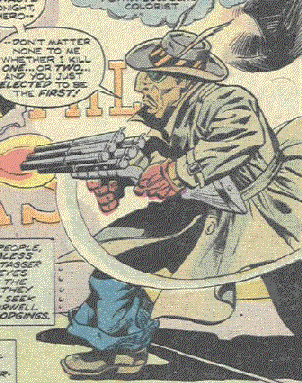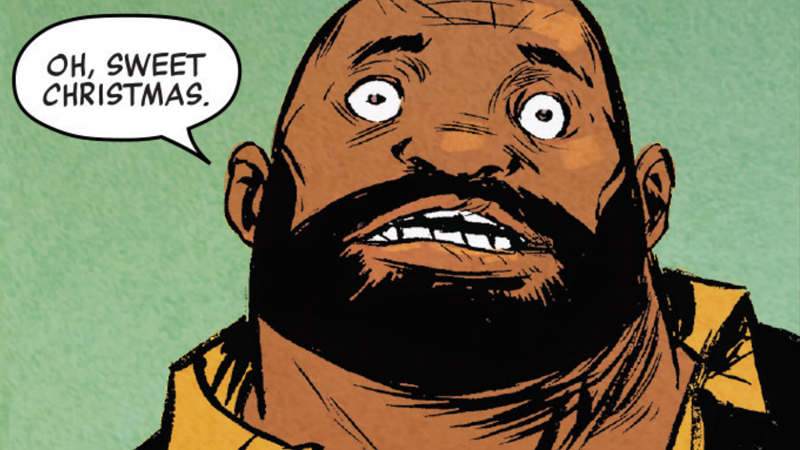Okay, technically Luke Cage season 2 hit Netflix in June, but I did most of my watching in July. And it was the later episodes where it really deserves the "Sweet Christmas" anyway.
Note, there will be spoilers here, intensifying as the post goes on. I will give away a lot of the big reveals as part of my evaluation of the season. Nothing dangerous in the first few paragraphs, though. And I'll cut to the chase here before any spoilers and say I really liked the season, although I found it started a little slowly.
We've had enough "Marvel Netflix Universe" shows (they're sort of in the Marvel Cinematic Universe, but much like Agents of SHIELD they don't really impact the movies, and they've become kinda their own sub-universe) to get some feel for what sort of stories they try to tell. And what they generally shoot for are character development pieces. Sure, there's big menaces and supervillains and stuff, but the focus is on how the characters overcome their inner demons while punching their outer demons.
Unfortunately, this presents them with a problem whenever someone gets a second season. Most of the first seasons did a pretty good job of setting up the characters' Big Problems (can Daredevil find a way to deal with his guilt over his father's death, can Jessica Jones get over her abuse at the hands of the Purple Man, can Luke Cage deal with the ghosts of his past, can Danny stop being such an utter waste of screentime...okay, that one failed) and resolving them. Matt put on the costume. Jessica got resolution by taking Killgrave down. Luke fought his brother and cleared his name.
So, what to do next? If your stories are about confronting personal problems against a backdrop of puncheminnaface, and they dealt with their biggest problems, what do you do for an encore? They've had somewhat uneven success with Daredevil and Jessica Jones, mostly involving variations on, "Oh, they didn't actually deal with their problems after all." So I was a little worried as Luke Cage season 2 kicked off that it would be another jump backwards.
 |
| Spoilers beyond this point. But not Spoiler herself, she's DC. |
Fortunately, the jump backwards I feared didn't really happen, although the first two episodes looked like they might be leaning that way. Rather, the world moved on and Luke stayed comfortably where he was at the end of season 1, which turned out to not be enough.
On the character level, they started stripping away his support through a combination of "supporting character has had enough of Luke's crap" and just "life happens." Worse, he picks up some new supporting characters (the MNU version of D.W. may have been in season 1, but he definitely picks up the slack as a main supporting character here) whose helpfulness is suspect. D.W. creates an app that lets people find Luke whenever he does something newsworthy, which is an overt complication in a lot of the "punch people" plot elements, and Luke's father comes back into his life. Well, tries to. Luke has no particular desire to mend fences with his father at this point in his life, although it's more about his mother's death than the whole, "You had a bastard son you never told me about who grew up to frame me for murder and then try to kill me while wearing power armor," thing. Not that that bit helped.
So, character-wise, he desperately needs to grow more as a person and get out of his comfort zone, so losing a lot of his support and gaining some gadflies helps a lot.
In terms of the overt conflicts, the Harlem that Luke wants to protect is changing too. While many characters get development arcs in this season, Black Mariah is definitely at the center of the biggest one...she might even get more of the spotlight than Luke does. If Luke's family history is pretty bad, Mariah's is downright horrific, and revelations throughout the season just make it worse. Yes, it gets worse than "killed her cousin with a microphone stand and took over his criminal empire." Her attempts to improve her lot run right into a long-stewing revenge plot, and that forces Luke to grow as a person and as a hero over the course of the season.
 |
| Less bulletproof, more bullet-surviving. |
 |
| No hat in the MNU, though. |
Bushmaster's motivations aren't really explained fully until nearly the end of the season, but the actor definitely sells the fervor behind it. Mariah's family did his family wrong, wrong enough that only a painful death can balance the scales. Mariah wants to forget her family, Bushmaster refuses to forget his.
In the second half of the season, the conflict starts to really hit home for Luke, because the stability he'd relied on in order to be "not a hero" while protecting Harlem dissolves. First because Bushmaster has upset the status quo, and then because Mariah is going completely off her rocker as she fights back. Luke can't just keep breaking up the more obvious crimes and being a visible symbol, because not only did losing to Bushmaster damage his value as a symbol, the unwritten rules he depended on are falling apart.
Various supporting characters move in and out of the main character arcs. Colleen Wing appears early on as a sounding board for both Claire and Misty, eventually convincing Misty to accept a cybernetic arm courtesy of Danny's money. Danny himself shows up for a couple of episodes, and he seems to have done a lot of de-idiot-ing off-screen since Defenders, plus he got a better haircut. He helps with some punching, but helps even more with money (Luke calls it his real superpower) and actual not-too-bad advice. Some of them have sections of arcs, such as Claire finally deciding she needs a break after several seasons of being involved in superhuman bloodbaths, or Danny showing his improved personality. Misty's arc is all over the place, she hits rock bottom and bounces repeatedly, feeling useless and feeling replaced by a new detective who she went to high school with, but eventually rallying and being forced to fortify and face things when everything blows up in the fourth act.
But the main arcs belong to Mariah and Luke.
Mariah's arc is "I want to cement my legacy and spit in the face of my relatives," while Luke's is "I need to find a new way to protect my adopted home." As things become increasingly untenable for both characters, each is forced to adapt...and neither necessarily makes the best of choices in the process.
Key to both arcs is Mariah's estranged daughter, Tilda Johnson, who is first a pawn but who grows into a player. Her arc is, "The more I find out about my family, the more horrified I am, but the more determined I am to take control of the hell around me." She's a doctor who decided to become a herbalist rather than practice modern medicine, so she's valuable to Bushmaster when he needs more of his own supplies, in particular a breed of nightshade that only grows in Jamaica. But she also understands real medicine and how Luke's powers work, roughly. Mariah needs her more as a symbol of the falsely legitimate life she wants to build. As the fighting ramps up, everyone wants her on their side, and it's not entirely certain where she'll land.
 |
| They actually made the classic pom-pon hair look pretty good in live action. |
In the end, the villains all sort of get what they want, but probably not how they wanted it. Mariah does eventually get out of crime (and, well, everything) and leaves over three hundred million dollars to cement her legacy of Good Works. Bushmaster didn't get to kill Mariah himself, but he did get to destroy her, and ultimately was partly responsible for Tilda's heel turn. Shades...okay, he got hosed at pretty much every turn. But at least his life has simplified in the end.
The core internal conflict of Season 3 is clearly established, because the good guys also got what they wanted...may they choke on it. Luke finds a way to, he thinks, control crime without being a criminal himself. D.W. manages to make enough bank on Luke's fame to buy the lease on Pops' Barber Shop and re-open it as neutral ground in Harlem, but now he finds himself totally at odds with Luke: "If you're bossing crime, you're a CRIME BOSS!" he points out. Luke's father got to mend some fences, but had to endure some pretty horrifying violence along the way. (Sadly, the actor has passed away, so that pretty much writes a definitive end to that character's story. He got a memorial screen at the end of episode 13.) Misty ends up head of her precinct after bouncing in and out of even being a police officer, but her promotion happens because of events she'd never have wanted to see happen...and like D.W. she realizes that she may be opposing Luke in days to come, because you can't be an enforcer of the unwritten rules without breaking a lot of the written ones.
Overall, a strong season with several very good plot threads, even if the Mariah plot drags a bit in the first half. Plus, they've started looking forwards a little better, they've established a definite direction for season 3: Power tends to corrupt, and money is the best superpower of them all.
Dvandom, aka Dave Van Domelen, is an Assistant Professor of Physical Science at Amarillo College, maintainer of one of the two longest-running Transformers fansites in existence (neither he nor Ben Yee is entirely sure who was first), long time online reviewer of comics, wrote most of this piece on his 48th birthday, is an occasional science advisor in fiction, and part of the development team for the upcoming City of Titans MMO.
Sweet Christmas In July
![Sweet Christmas In July]() Reviewed by Dvandom
on
Friday, July 20, 2018
Rating:
Reviewed by Dvandom
on
Friday, July 20, 2018
Rating:




